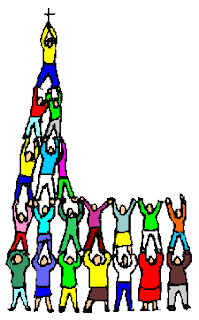 |
| There actually isn't enough to go around. |
The great fantasy of the 20th century ...
There will always be enough!
... and enough for everybody to have more.
The expectation of limitless growth was born with the Industrial Revolution, from sudden increases in productivity and wealth, resources converted into investor and consumer benefit. The 21st century has uncovered the error in our economic plan. There isn't enough to go around.
There isn't enough energy for everyone to use as they please. There isn't enough fresh water to irrigate freely or enough fossil fuel reserves to use without restraint. There aren't enough places to dump our garbage if the whole world were to consume the way the developed nations do. Not enough junk yards, not enough capacity for our chemical waste products ...
... neither the land, nor the oceans nor the sky can absorb our excesses like they used to. We've begun to disturb the balance, and our world is starting to resemble a run-down neighborhood.Time for change? It's already happening, and accelerating. Will we find a way through? Probably, since our survival depends on our doing so.
The climatologists and environmentalists may have understated the immediate prospects. Today's green initiatives offer some options for micro-survival, but civilization today is macro and moving more rapidly than the proposed solutions.
 A large measure of the cause seems perhaps to be philosophical. To Have or To BE? The question, posed by Eric Fromm, leaves the auditorium echoing with the silence of an unprovided answer. Failing to engage the question, the world's nations now struggle with the first half alone.
A large measure of the cause seems perhaps to be philosophical. To Have or To BE? The question, posed by Eric Fromm, leaves the auditorium echoing with the silence of an unprovided answer. Failing to engage the question, the world's nations now struggle with the first half alone.Just a couple of interesting notes:
An increasing number of countries are leasing land abroad to sustain and secure their food production.
Improved agricultural productivity is necessary to achieve food security and reduce poverty and hunger. For every $100 of agricultural output, developed countries spend $2.16 on research and development (R&D); developing countries spend $0.55 (IFPRI, 2008). |
| (2013: Water consumption ranges from 20 liters per person per day in developing countries to 600 liters per person per day in the U.S.) |
Water Scarcity Index
Overuse is damaging the major basins. High overuse occurs with irrigated agriculture, such as the Indo-Gangetic Plain in south Asia, the North China Plain and the High Plains of North America, and in areas of urbanization and industrial development.About 1.4 billion people live in river basin areas that are ‘closed’ (water use exceeds recharge levels) or near closure. The unsustainable water debts are extensive. Farmers near Sana’a in Yemen have deepened their wells by 50 meters over the past 12 years, while the amount of water they can extract has dropped by two-thirds. A few people have the skills and resources to leave their water problem for another place. Many millions, such as small farmers, agricultural laborers and pastoralists in poor countries, do not. (Human Development Report 2006)
It's here, and now we have to deal with it.
Here's our chance to rethink what's important and change the way we and our children live. We get to
choose.
Our hope is in more than the things the world holds dear, of course.
Our hope is in more than the things the world holds dear, of course.













